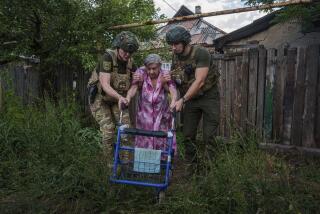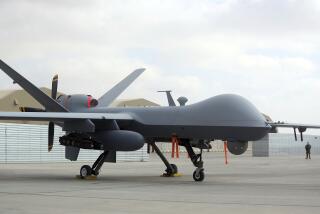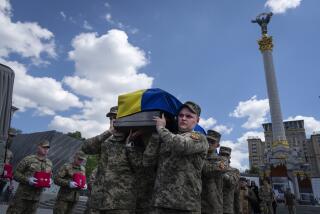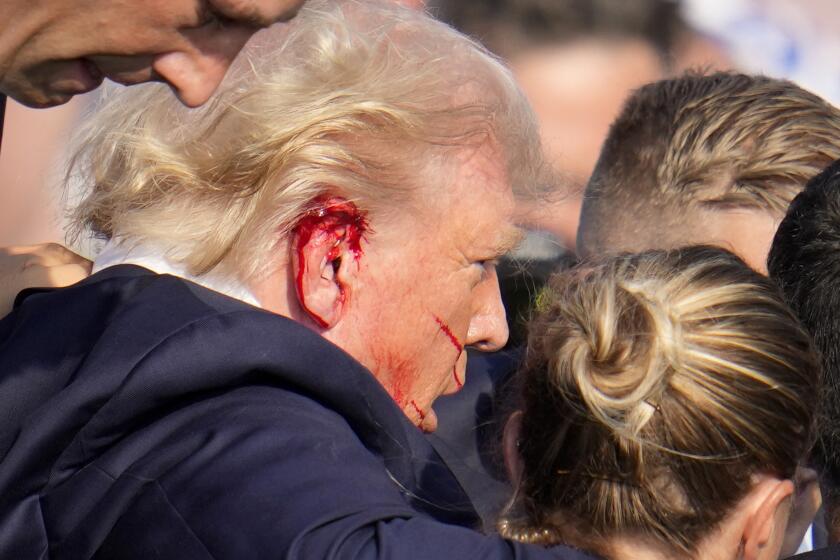Russia resuming Cold War-era bomber flights close to U.S. shores
In response to NATO’s “anti-Russia inclinations,” the Kremlin will resume its Cold War-era practice of sending long-range bombers to patrol the western Atlantic and eastern Pacific, Russia’s defense minister announced Wednesday.
The flights, which will extend to the borders of U.S. territorial waters, follow a markedly more aggressive air defense posture by Russia in the eight months since it seized and annexed Ukraine’s Crimea region in March, according to European strategic analysts.
Moscow’s nuclear-capable strategic bombers regularly conducted flight operations near the U.S. maritime borders during the Soviet era but the long-range flights were sharply curtailed after the 1991 collapse of the Soviet Union and the division of its defense forces among its 15 republics, which became independent states.
Defense Minister Sergei Shoigu announced the moves, intended to flex Russia’s global military muscle, at a meeting of the national military council on Wednesday. He did not say whether the long-range operations were already underway or how frequently the bomber runs would be conducted.
“In the current situation, we have to maintain military presence in the western Atlantic and eastern Pacific, as well as the Caribbean and the Gulf of Mexico,” Shoigu told the council, which composed of the armed forces chiefs of staff, representatives of government security agencies and civilian defense officials.
“This is connected to the situation in Ukraine, with the emerging anti-Russia inclinations on the part of NATO and the increasing foreign military presence in the immediate vicinity of our borders,” Shoigu said.
The defense minister also said conditions in Ukraine “dictate the necessity to maintain readiness of troops” in Russia’s Southern Military District, which borders eastern Ukraine, and that Crimea would be reinforced with “full-fledged and self-sufficient” defense capabilities.
Russian troops seized the Crimean peninsula, where the Kremlin’s Black Sea fleet is based, after a pro-European rebellion in western Ukraine ousted Moscow-allied former President Viktor Yanukovich in February. The March 16 annexation of Crimea to the Russian Federation sparked pro-Russia separatist actions that have spiraled into an armed conflict that has taken more than 4,000 lives in eastern Ukraine.
The resumption of long-range patrols was hinted at earlier this year, when Shoigu said Russia was negotiating with allies in Latin America and Asia for potential use of their bases and maintenance facilities. The defense chief mentioned at the time talks under way with former Soviet military allies in Cuba, Nicaragua, Venezuela and Vietnam.
Since the Crimea seizure and the violent clashes between Ukrainian troops and Russian-backed separatists in eastern Ukraine spurred a tense new crisis in Russia’s relations with the West, the Kremlin’s air force has been conducting what European monitors see as provocative forays into and near the airspace of its neighbors.
On Monday, the London-based European Leadership Network reported a sharp increase in Russian air operations that have been condemned by the North Atlantic Treaty Organization, including violations of other countries’ airspace, narrowly missed collisions, buzzing of NATO and Ukrainian warships and mock bombing runs. Three of the 40 incidents cited in the report were said to have had a “high probability” of causing casualties or military confrontation.
NATO reported last month that the number of incidents involving Russian planes and ships that it considered provocative has tripled this year, to more than 100, including mass aerial maneuvers that posed risks to civilian air traffic in northern and eastern Europe.
Russia has routinely denounced what it considers encroachment by NATO into the countries of Eastern Europe that were once part of the Soviet Union or dominated by the communist giant during the Cold War.
Russian President Vladimir Putin has repeatedly warned the U.S.-led alliance against what he sees as attempts to drive Russia away from its traditional sphere of influence.
Follow @cjwilliamslat for the latest international news 24/7
More to Read
Sign up for Essential California
The most important California stories and recommendations in your inbox every morning.
You may occasionally receive promotional content from the Los Angeles Times.






